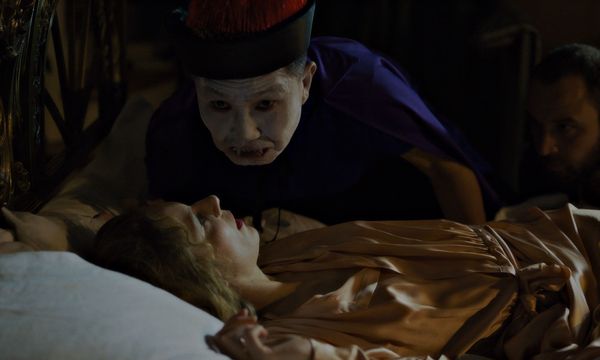Eye For Film >> Movies >> Bloodsuckers (2021) Film Review
Bloodsuckers
Reviewed by: Mateusz Tarwacki

In his Bloodsuckers, Julian Radlmaier undertakes the extremely difficult task of creating an effective satire that is capable of deconstructing material that has grown to the level of a myth - in this case, Karl Marx's Capital and Marxism, understood broadly as an idea and political direction, and narrowly, as a kind of moral code, a set of rules. It's a job that requires either unprecedented genius, strong knowledge of all political and social nuances, or a blind stroke of luck. The young German director, who is known for his political deconstructions (e.g. Self-Criticism Of A Bourgeois Dog, from 2017), tries to kill a few birds with one stone. He criticises, of course, capitalism and the bourgeoisie, but also points out the weaknesses of the intellectual and the working-class left.
Bloodsuckers follows the story of Baron-impostor, Ljowushka (played by Georgian filmmaker, Aleksandre Koberidze), a failed actor and fugitive from Soviet Russia who arrives at a coastal German town looking for possibilities to travel to the States to try his hand at Hollywood. In an effort to raise funds for a ferry ticket, Ljowushka becomes embroiled in a complicated conflict between a local aristocrat-industrialist, Octavia (Lilith Stangenber), and the employees of a factory (owned by Octavia). What if it turned out that Marx, when writing about capitalists sucking blood of the working class, he literally meant that they were vampires?

The idea for the narrative seems to be simple, based on the absurdity of a crooked mirror in which the real world of similar dependencies is reflected. Radlmaier more or less scornfully points out the weaknesses of both groups – vampire capitalists and leftist workers – who seem equally absurd. Octavia is ridiculous to say that Jakob (Alexander Herbst) is not her servant but a personal assistant, as if being on a first-name basis would blur class differences. The meetings of the working class interpreting Capital, whose members deliberate vigorously over the literality of the metaphors used by Marx is similarly nonsensical.
The world presented by Radlmaier is a creation in which not only are the social relations absurd but the time is mixed up – the action of the film takes place shortly after Lenin's death, although modern cars drive on the streets. The German filmmaker does not hide the fact that it is ironic, reminiscent of Bruno Dumont's 2016 film Slack Bay.
Both films deconstruct class conflict with similar commitment, although Bloodsuckers is much calmer, gentler, less blunt and less coarse, which is not necessarily to its advantage. The obvious difference is that Radlmaier does not portray cannibalistic peasants, but vampire capitalists who suck the blood from workers.
The question that arises during the screening is, who exactly was this movie made for? Is it the perspective of the young, large-city leftists, ironically referring to the political past? Or is it an attempt at a socio-political commentary, a story about class betrayal and the fact that the world cannot be changed? Sadly, Bloodsuckers is tedious and doesn't succeed in its comedy. Perhaps it is missing Dumont's decisive claw, or it lacks the final unmasking of the theatrical and ironic creation – without it, the film’s climax is neutered.
Reviewed on: 03 Mar 2021
















